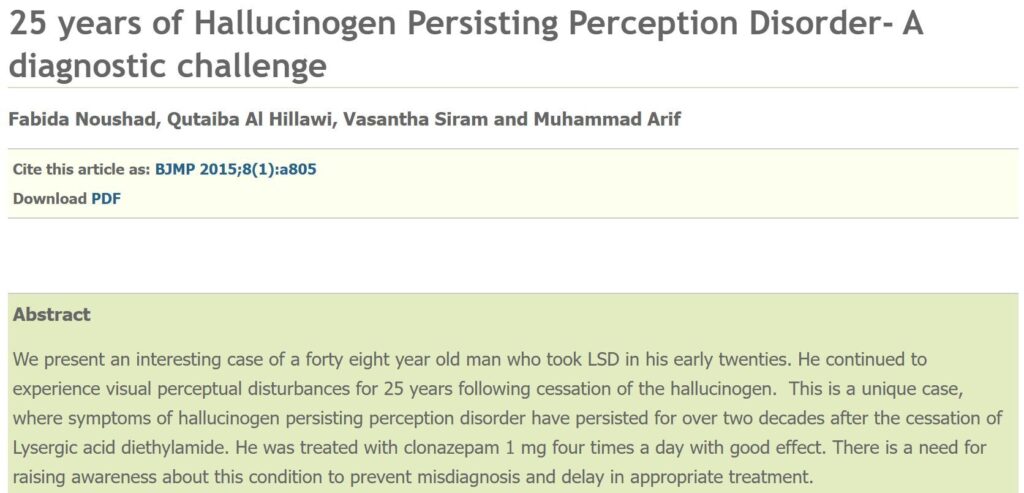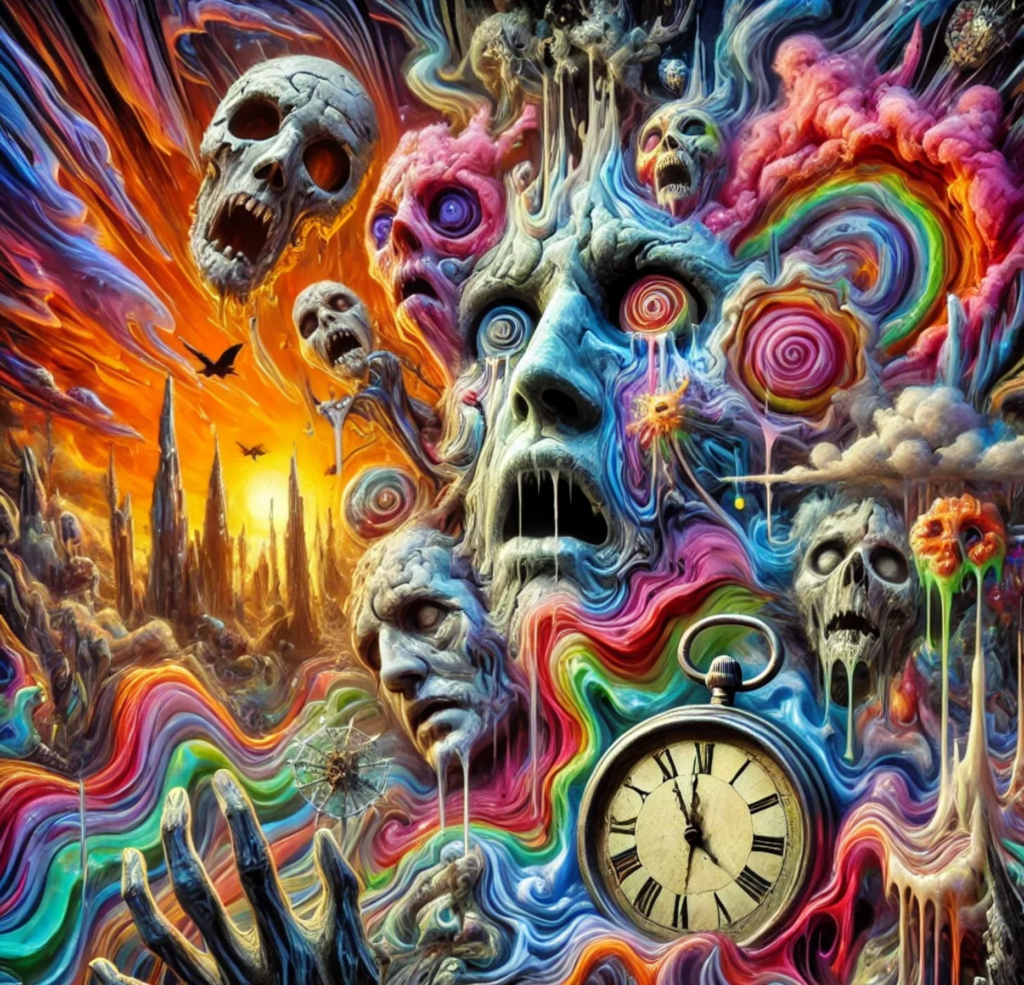Psychedelics in general and my personal experiences with them are discussed here.
Some people-who-must-not-be-named, with audiences numbering in the millions, promote the use of psychedelics without ever warning against the risk of hallucinogen persistent perceptive disorder (HPPD) – not even cursorily. This is not just irresponsible but also puzzling as these permanent perceptual distortions are by no means rare.
Realistic estimates say that about 4-5% of people who take psychedelics “responsibly” develop HPPD – contrasted to about 50% of polydrug users who regularly use psychedelics combined with other drugs (particularly THC). Given that many millions of people experiment with psychedelics, the absolute number of people with HPPD is presumably quite high. Weird that nobody ever talks about HPPD.
HPPD is also not controversial like for example, post-finasteride syndrome or post-SSRI sexual dysfunction. HPPD is a recognized condition described in DSM V and DSM IV with a diagnostic code 292.89. In fact, HPPD has already been introduced under the diagnosis of Post-Hallucinogen Perception Disorder in 1987 within the DSM-III.
HPPD is a state in which people experience lasting visual distortions after the use of drugs, most commonly psychedelics. As the psychiatrist Scott Alexander says in his article on the topic, if he were a “warrior on drugs” this would be included among his arsenal of major anti-drug arguments.
The most common symptoms are visual snow (“visual static”) and perceptual geometric alterations (e.g., “breathing” walls). Below is a picture of what it is like to suffer from HPPD, created by a Reddit user.

HPPD
According to this Reddit group (r/HPPD link), HPPD seems to cause quite a bit of suffering to quite a few people. Given the popularity of psychedelics, it is a mystery to me why HPPD is such a fringe topic. Fortunately, for most people, the symptoms seem to get better with time – however, not for everyone and some will have it permanently. About 50% of users remit spontaneously and gradually over a couple of months – particularly if they cease drug use.
For 50% of people, the duration of HPPD is less than a year. For 30% of people, it is one to five years. For an unlucky 20% of people, it is over 5 years – for many of them permanent. LSD accounts for about 80% of cases, and most of the other cases are due to MDMA and cannabis. Interestingly, if not combined with THC, psylocibin rarely causes it.

Whatever the cause, for most people, the onset is instant. They wake up after tripping only to realize they are still “tripping” … and they keep “tripping”. However, in about 25% of users, the onset is more than a month later. For most people, the major (reported) symptom of HPPD is “visual snow”, which can be compared to the visual static on old behemothy TV screens.
However, a lot of people report (and many more likely have) non-visual symptoms as well. Non-visual symptoms, which may entail someone’s thinking getting “weirder”, are much harder to notice and therefore may usually remain unrecognized. Reports of long-lasting anxiety and “weirdness” after use of psychedelics are quite common.
This makes me wonder whether some cases of hallucinogen-triggered psychosis are actually just severe cases of HPPD. If this is the case, then, in rare cases, hallucinogens can potentially cause schizophrenia (which is rather a heterogenous unspecific catch-them-all term than a single disorder) and not just trigger a psychotic episode in psychosis-prone individuals.

Do psychedelics have permanent effects?
It is well known that taking psychedelics may cause long-lasting personality changes, in particular the traits “openness” and “suggestibility”.

Most people assume that this is due to the life-changing experiences these drugs somewhat reliably cause. However, it is at least theoretically plausible that these permanent personality changes are neurological (bottom-up) and not just psychological (top-down).
It is certainly no coincidence that after taking LSD, many (reportedly) have become more spiritual and even religious (“hippification”). If psychedelics can actually change the hardware (and not just the software), this may not exclusively be due to the “eye-opening” experience people have had under their influence but may have (in part) a neurobiological background.

Of topic note: And given that some people are naturally quite “entropic” even without ever having ingested LSD, some scientists believe that religiosity, or the tendency for mysticism or esoterism, has a neurobiological basis.
The bottom line is that many people who do psychedelics (in particular LSD) may get slight permanent distortions to their vision, and perhaps even to other mental faculties as well as personality. Most will not even notice this. Some may truly become a (slightly) different person. This is not necessarily bad. In fact, for many people, this is the point.
There are two major theories on how HPPD arises
Theory #1: Memory formation
Some researchers believe that HPPD arises simply due to long-term potentiation (i.e., memory formation). Given that neural systems are prone to memory formation (i.e., past experiences modulate present response by way of an alteration in neural pathways), it is plausible – if one “delves too deeply” – to entrain one’s neural wetware to respond in certain ways.
So, it could be that the intense firing going on during a trip is somehow being “imprinted” on cortical or thalamic networks. The result is lasting hyperactivity of the neurons and pathways involved. This theory would explain why for over 50% of people HPPD gets better by itself over weeks to months – the memory trace simply starts to vanish over time.
Theory #2: Neurotoxic cell death
The second major theory on how HPPD arises hypothesizes that HPPD is caused by the excitotoxic destruction of inhibitory GABAergic neurons in the thalamus or cortex.
This is analogous to the permanent tardive dyskinesias following the use of antipsychotic drugs, which are thought to be caused by the irreversible destruction of a subset of certain neurons. This theory would explain why for about 20% or so the disorder does not get better. Ever.
Subscribe to the Desmolysium newsletter and get access to three exclusive articles!
Aggravating and mitigating factors
Of the hallucinogen-induced cases of HDDP, LSD is thought to account for about 80%. LSD is much more prone to cause this than psilocybin – in part because LSD is much longer lasting and in part because LSD is much more stimulating (in the sense that LSD has stronger effects on glutamate and dopamine systems).
Furthermore, for some reason, concurrent THC consumption seems to multiply the risk. No amount of “finding yourself” is worth developing HPPD for it.
Another aggravating factor may be exposure to bright lights. Looking at bright lights (e.g., sun) while “the gates are thrown open” (i.e., the thalamic inhibition is disinhibited as explained here) may either cause lasting long-term potentiation or, worse, induce the death of inhibitory interneurons in the visual cortex and/or in the visual parts of the thalamus due to excitotoxicity (cell death due to neuronal overexcitation).

How to prevent HPPD
It should be said that the condition is very poorly researched. After reading various articles on the topic and talking to people who have it, I collected a number of things that may reduce the risk of developing HPPD.
- Wearing sunglasses, especially at festivals or on bright sunny days
- Using psilocybin (“shrooms”) instead of LSD. This alone can likely prevent a sizeable percentage of HPPDs.
- Avoiding weed before, during, and after. Weed + psychedelics (including psylocibin), if done in excess, seems to be a surefire way to eventually develop HPPD.
- Avoiding “heroic” doses
- Waiting at least 1 month between trips (ideally, more)
- Avoiding consumption of amphetamines (including MDMA) – and perhaps even caffeine – while on psychedelics as stimulants increase neuronal excitation. L-theanine also seems to be a bad choice because it is known to elevate glutamate levels at low doses.
My opinion on how to treat HPPD
- Time & abstinence: As so often, time helps. Up to 50% of cases seem to remit spontaneously within a few months. If people get some HPPD symptoms, they should stop using psychedelics immediately. If they “must” trip, taking a low dose of a GABAergic substance may be somewhat protective against overexcitation and long-term potentiation.
- Pharmaceutical drugs: In more severe cases, symptoms can be improved by benzodiazepines, which potentiate the activity of GABAergic interneurons (as discussed here). A safer alternative may be lamotrigine, which anecdotally helps some HPPD patients (though is far from a “cure”).
Other dangers of psychedelics
I discuss other, in my opinion, underestimated, risks of psychedelics in more detail here: Psychedelics Are Not Toys

Sources & further information
- Scientific review: On Perception and Consciousness in HPPD: A Systematic Review
- Anecdotes: Reddit – r/HPPD
- Opinion articles: Scott Alexander has two great articles on this:
Disclaimer
The content available on this website is based on the author’s individual research, opinions, and personal experiences. It is intended solely for informational and entertainment purposes and does not constitute medical advice. The author does not endorse the use of supplements, pharmaceutical drugs, or hormones without the direct oversight of a qualified physician. People should never disregard professional medical advice or delay in seeking it because of something they have read on the internet.Psychedelics in general and my personal experiences with them are discussed here.
